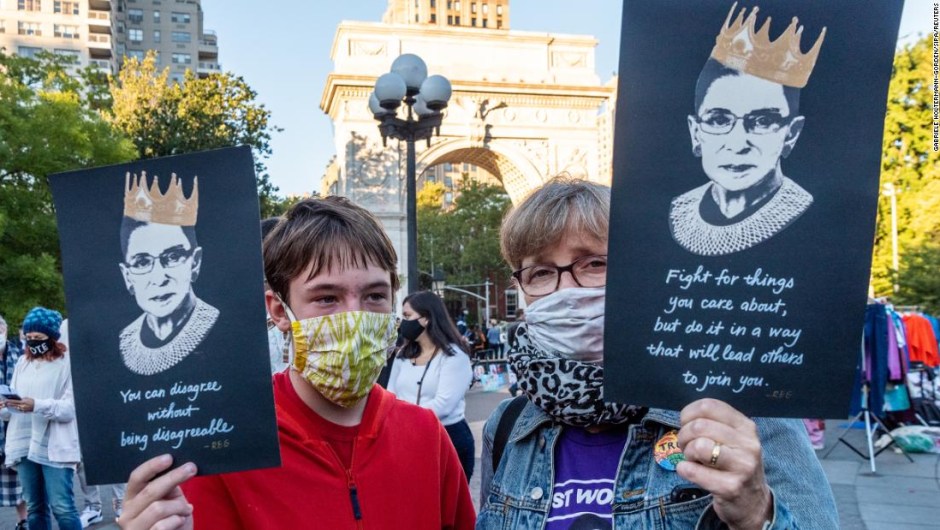Editor's Note:
Peniel E. Joseph is the Barbara Jordan Professor of Ethics and Political Values and Founding Director of the Center for the Study of Race and Democracy at the LBJ School of Public Affairs at the University of Texas at Austin, where he is also History teacher.
He is the author of several books, the most recent "The Sword and the Shield: The Revolutionary Lives of Malcolm X and Martin Luther King Jr."
The opinions expressed here are yours.
See more opinion pieces at cnne.com/opinion
(CNN) -
Ruth Bader Ginsburg's legacy, in many ways, is fundamentally important to understanding our current national and global era of Black Lives Matter.
In fact, its presence in popular culture is based in large part on the global popularity of hip hop, which represents a defining cultural innovation of post-civil rights America.
Ginsburg and hip hop legend Christopher Wallace, aka "Notorious BIG," shared a Brooklyn-born heritage, forged in the melting pot of a neighborhood famous for producing icons (Jay-Z, for example) who started out as underdogs.
Shana Knizhik, a law student at New York University, gave Judge Ginsburg the nickname "Notorious RBG," popularized through a Tumblr account and a later book co-authored with journalist Irin Carmon.
Ginsburg acknowledged that she and Wallace were born in Brooklyn, but had little more to say about the comparison.
The woman who became Notorious RBG was a Harvard- and Columbia-educated lawyer who, in the language of the streets, 'took no shorts', meaning she did not take fools with joy.
But the same passionately brilliant legal mind that criticized the Supreme Court's callous decision to stop protecting the voting rights of all Americans in the
Shelby v.
Holder
from 2013 also exhibited some blind spots.
LOOK: Army of secretaries of Judge Ruth Bader Ginsburg stands guard with her body in the Supreme Court of Justice
On the subject of race, chief among them was his response, then backtracked, when NFL quarterback Colin Kaepernick knelt during the national anthem to protest racial injustice.
Ginsburg, in an unexpected moment with Katie Couric in 2016, which he came to regret, called the protests "silly and disrespectful."
(He later said that his comments had been "inappropriately derogatory").
Kaepernick, who surely knew the now well-founded image of Notorious RBG as a pioneering political maverick, publicly admitted that her comments were "disappointing," but stopped there.
Remembering Ginsburg's harsh opening remarks about Kaepernick's peaceful protest against racial injustice, and reading them through the lens of her pop culture persona as Notorious RBG, is not a call to cancel it posthumously.
Rather, it is an opportunity for us to recognize the often unspoken limits of interracial political solidarity and affirm the need for intergenerational and multiracial empathy within, amidst, and between communities and leaders pursuing social justice.
The T-shirts and paraphernalia that portrayed Judge Ginsburg's wise face, framed by her signature outfit, under a slanted crown like the one Wallace originally wore in his "King of New York" photo shoot three days before his murder in 1997, helped, along with a documentary, a feature film, books, essays and opinion pieces, to turn Justicia Ginsburg into a multigenerational and multiracial feminist icon.
Judge Ginsburg, through a rhetorical sleight of hand that she did not initiate, managed to access all the freshness, fashion, and appeal of blackness without the exposure of racist terror, arrest, violence, and punishment.
Since her death, images of a smiling Ginsburg embracing President Barack Obama during State of the Union speeches, through symbolism, have further underscored the tense and sometimes disrupted connection between struggles for racial and gender justice. that continue in our time.
These interpretations were sadly made even more ironic due to the nickname that will survive her.
That 'Notorious RBG' moniker evoked the lyrical genius of Wallace, a former drug dealer turned rap artist whose ability to distill joy and the trauma of growing up poor and black in Reagan-era Brooklyn continues to fuel generations of lovers of music.
The "Notorious BIG" represented, to many white Americans during the 1990s, the specter of the "super predator," the literal heart of America's racial underclass darkness who believed it was destined to wreak havoc in the suburbs if he was not immediately arrested, jailed and punished.
Or died prematurely.
Wallace, affectionately known in the hip hop community as "Biggie," rapped with an unwavering awareness of how his lyrical depiction of racism, crime, violence and the pursuit of success would be perceived by white audiences.
MORE: Trump Booed As He Pays Tribute To Supreme Court Justice Ruth Bader Ginsburg
That the scowling image of Wallace, adorned with a crown on his obsidian face, could be improbably transposed to Judge Ginsburg in a way that would make it cool, fashionable and popular without the danger associated with hip culture. hop is, in a way, unsurprising.
In doing so, Notoria RBG became a social justice icon of the millennial generation, the object of intergenerational admiration that helped put a human face on complex social justice issues decided in the highest court in the nation.
But there was also an act of appropriation in this name.
Notorious RBG reached the hearts and minds of millions of young people on a scale that Deputy Supreme Court Justice Ruth Bader Ginsburg perhaps never could, despite her enviable educational pedigree and brilliant legal mind.
The name gave her a conventional take on street arrogance that helped turn Christopher Wallace into an icon whose untimely death, by a gang-style murder in 1997, helped turn her image into legend.
While the denomination was by no means the only factor contributing to its iconic status, which was further solidified over and over again by fierce dissenters in cases like
Ledbetter v. Goodyear Tire & Rubber Co. and Burwell v. Hobby Lobby
, somehow. , her personality as a Notorious RBG and her stature at the bank reinforced each other to propel her further into a cultural legend.
For many Americans, especially the younger ones, his admiration for the essence of Ginsburg's ferocity and toughness as a jurist found an identifiable outlet to express himself through his Notorious RBG status.
In her empathetic prime, Judge Ginsburg recognized herself and the difficult path she faced in breaking down barriers to becoming the first full professor at Columbia University School of Law and the second justice on the Supreme Court in the stories, lives and struggles of others.
And her advocacy for justice for women positively affected women of color.
Yet race, as is often the case in American history, represents perhaps the hardest barrier to see and the easiest to ignore.
Judge Ginsburg's ambivalent response to Kaepernick's protest illustrates the current need for greater racial empathy, broad and deep enough to evolve into political solidarity.
Imagine a world where white women in power, future RBGs if you will, not only recognize dignity and effervescent humanity in Martin Luther King Jr.'s march from Selma to Montgomery (as Ginsburg did in his powerful dissent in Shelby), but they also see their own faces in the young black women and men who have led demonstrations across the country seeking the kind of justice that propelled a daughter of Jewish immigrants born in Brooklyn during the Great Depression to become an icon. feminist.
Ruth Bader Ginsburg









